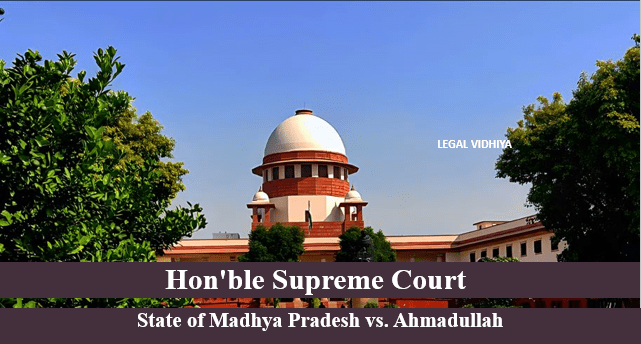
Citation- AIR 1961 SC 998
Date of Judgement- 25TH January, 1961
Court- Supreme Court of India
Case type- Criminal Appeal No. 120 of 1960
Appellant- State of Madhya Pradesh
Respondent- Ahmadullah
Bench- N. Rajagopala Ayyangar
Facts of the Case:
The deceased Bismilla was related to the accused as the mother of his wife Jinnat, whom he had divorced. The accused had borne ill-will against his mother-in-law.
Bismilla went to bed in her own house on the night of September 28, 1954 and on the morning of the next day, her body was found by her husband lying in a pool of blood on the cot on which she was sleeping with the head missing.
The FIR was immediately lodged by her son and the police were also informed about the ill-will that the accused borne towards Bismilla.
The respondent admitted having committed the murder and stated that he had put the head of Bismilla and the knife which he had used in a cloth-bag and hidden it in an underground cell in the furniture shop of his father.
The respondent was taken to that shop where he took out the articles in the presence of Panch-witnesses. The accused further stated the modus operandi of the murder.
The respondent was produced before the District Magistrate where he made a confessional statement reciting all the above facts. He was thereafter committed to stand his trial before the Court of Sessions Judge, Gwalior, for the offence under sec. 302 of the Indian Penal Code.
Ahmadullah confessed to the crime, but he pleaded insanity at the trial.
The Sessions Court acquitted Ahmadullah on the ground that he was of unsound mind at the time of the commission of the crime. The High Court upheld the acquittal, and the State of Madhya Pradesh appealed to the Supreme Court.
ISSUES:
- Whether the accused, Ahmadullah, was of unsound mind at the time of the commission of the crime?
ARGUMENTS:
On behalf of the accused, in support for the plea of unsoundness of mind, 3 witnesses were examined, 2 being medical men. The first witness was Mahavir Singh, a District Civil Surgeon and Superintendent of the Mental Hospital, who spoke of treating the accused two years ago and his deposition was that the accused had an epileptic type of insanity.
The other medical witness was the Superintendent of the Mental Hospital who had examined the accused on and after November 18, 1954, nearly two months after the occurrence of the murder and his deposition also was to the effect that the accused was suffering from epileptic insanity.
The third witness who spoke of the mental condition of the accused was the father. He stated that he saw the accused in a disturbed state of mind on the evening of September 28, 1954. On the morning of the next day, the witness found the accused at the shop, unconscious with his hands and feet stiffened.
The learned Session’s Judge contented that soon after the crime, the accused was admitted to the mental hospital and the Superintendent of the Hospital confirmed that the accused suffered for epileptic fits and since people with epileptic insanity commit brutal murders, just like in the instant case, there is ground to believe that he may have committed the murder in a fit of epileptic insanity. Thus, the Session’s Judge found the accused guilty of the offence of murder but by reason of unsoundness of mind and that he was incapable of knowing what he was doing and therefore, directed the acquittal of the accused.
The State then filed an appeal to the High Court. The High Court concurred to the opinion of the learned Session’s Court and dismissed the appeal on the reasoning that the Session’s Judge was satisfied that the defence had discharged the onus of proving that the accused was of unsound mind at the time of the commission of the murder and now it was for the State to establish as to why that reasoning or decision should be reversed.
JUDGEMENT:
The judgement of the Court was delivered by Justice Ayyangar. The court refused to concur with the aforementioned conclusion and reasoning. According to the Supreme Court, the error in the judgment of the High Court consisted in ignoring the fact that there was nothing on record on the basis of which it could be said that while in the act, the accused was incapable of knowing that what he was doing was wrong or contrary to law.
The Court also referred to the decision of the Court of Criminal Appeal in England in Henry Perry, where also the defence was that the accused had been prone to having fits of epileptic insanity. While dismissing the appeal, in the said case, the Chief Justice had pointed out that it must be shown that the man was suffering from an epileptic seizure at the time he committed the murders.
The Supreme Court contented that the Courts below had failed to take into account the circumstances in which the killing was done. The ill-will towards the victim, the commission of the crime at night, use of a torch light to locate Bismilla, gaining access to the house by scaling over the walls – all pointed to the direction that the crime was not committed in a sudden mood of insanity but only after careful planning.
The appeal was therefore allowed. The court found the accused guilty of murder under section 302 of the Indian Penal Code but taking into account the acquittal by the Session’s Judge and the High Court, sentenced him to rigorous imprisonment for life rather than sentencing him to death. The Court also added that the State Government will take steps to have the accused treated in an asylum until he is cured of his illness, if this still continues.
Written by Tanisha Singh an intern under legal vidhiya.




0 Comments